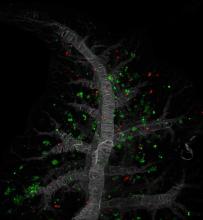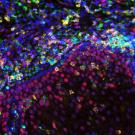News
Cancer Center Launches Early Detection Project to Arrest Cancer Before it Spreads
UC San Francisco is embarking on a bold initiative to catch cancer in its earliest forms and prevent it from progressing. The goal: to detect and halt cancer before it takes root and spreads, potentially reducing the often-severe toll of the disease. The initiative will be called Cancer Early
In Judo Move, Scientists Use Cancer’s Strength to Fight Against It
Immunotherapies using engineered T cells have ushered in a new era in cancer treatment, but they have their limits. They may cause side effects or stop working, and they do not work at all against 90% of cancers. Now, scientists at UC San Francisco and Northwestern Medicine may have found a way
Two of San Francisco’s Longest-Serving Hospitals Join UCSF Health
UCSF Health has signed a definitive agreement with Dignity Health to acquire Saint Francis Memorial Hospital (Saint Francis) and St. Mary’s Medical Center (St. Mary’s), along with associated outpatient clinics in San Francisco. The organization hopes to close the transaction in spring 2024. Building
Dr. Ajay Maker Appointed Surgeon in Chief for the Helen Diller Family Comprehensive Cancer Center
Ajay Maker, MD, FACS, FSSO has been appointed to the position of Surgeon in Chief for the Helen Diller Family Comprehensive Cancer Center. This is a newly created role charged with developing and helping implement strategies to enhance and optimize clinical operations in the adult cancer service
Could Two Drugs Be Better Than One for Treating Prostate Cancer?
Combining testosterone-blocking drugs in patients with prostate cancer relapse prevents the spread of cancer better than treatment with a single drug, a multi-institution, Phase 3 clinical trial led by UC San Francisco researchers has found. The approach can extend the time between debilitating drug
49ers Coach With Aggressive Myeloma Gets New Treatment at UCSF
Johnny Holland has faced fierce foes for decades, first as a standout tackle in the National Football League, then as a beloved coach with the San Francisco 49ers. But when it comes to being poked by a nurse with a needle, the gridiron warrior shuts his eyes and scrunches his face. "No matter how
Cancer Researcher Thomas Martin Receives $4.6 million CIRM Grant
UC San Francisco’s Thomas G. Martin, MD, a leading expert in blood cancers, has received a grant of nearly $4.6 million from the California Institute of Regenerative Medicine (CIRM) to produce a CAR T cell therapy for multiple myeloma, the second most common malignancy among blood cancers. The









